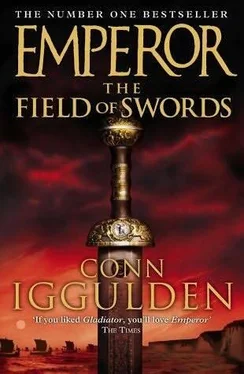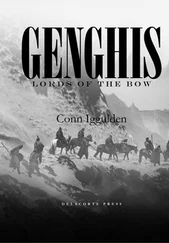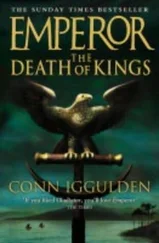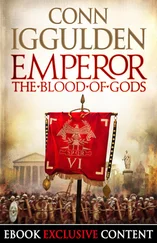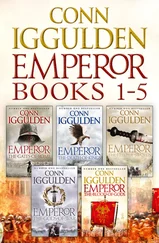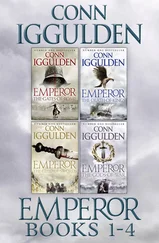“Countries are taken in blood. Women are raped, men killed, every horror you can imagine occurs a thousand times over, but then it ends and the victors settle the land. They farm and build cities and make laws. The people thrive, Adàn, whether you like it or not. Then there is justice and rule of law. Those who prey on their neighbors are executed, cut out from the rest. They have to be, because even conquerors grow old and value peace. The blood of the invaders is mingled with the people on the land until a hundred years later they are not Celt or Carthaginian, or even Roman. They are like… wine and water, impossible to separate. It begins in battle, but they are raised by each wave, Adàn. I tell you if I ever find a country that has not been tempered in fire, I will show you savages where we have built cities.”
“You believe this?” Adàn asked.
Julius opened his eyes, the dark pupils gleaming. “I do not believe in a sword, Adàn, because I can see it. It is just the truth. Rome is more than iron swords and harder men. I will bring them up, kicking and screaming. Gaul will suffer under my hand, but I will make them greater than they can imagine by the time I’m done.”
The messenger sent by Mark Antony arrived at the door, clearing his throat softly to draw their attention. Both men snapped out of the reverie and Julius groaned, holding his head.
“Find me a cold cloth and see if Cabera has any of his powders for pain,” he told the young man. As he turned back, he saw Adàn’s expression was grim.
“It is a strange view, General,” the young Spaniard ventured. “I can see why you would think such a thing, with an army poised to rush over Gaul. But it will be little comfort to the families that lose their men in the days to come.”
Julius felt anger spike in him as the headache throbbed. “Do you think they are weaving flowers for each other while we sit here? The tribes are at each other’s throats, boy. At forty years old, Mhorbaine’s one of the tribal ancients. Think of that! Disease and war take them before they go gray. They may hate us, but they hate each other a great deal more. Now, let us leave this for another time. I have a letter to dictate for this Ariovistus. We will ask this ‘Friend of Rome’ to go quietly back from the lands he has conquered and leave Gaul behind him.”
“Do you think he will?” Adàn asked.
Julius did not answer, but gestured for Adàn to take up his writing tablet and began to dictate the letter to the king of the Suebi.
Clearing the forests for the new road out to the plain took longer than Julius had hoped. Though the legions worked full days in the summer heat, each massive oak had to be cut down and then dragged out by teams of axmen and oxen. Cabera had begun to train some of the legion boys as assistants to deal with the broken bones and wounds that were the inevitable result of such labor. Two months passed agonizingly slowly before the first stone could be laid, but by the end of the fourth, the flat stones stretched almost forty miles, wide and strong enough to take the great catapults and siege machines without a tremor. New quarries had been dug in the hills and granite posts marked the miles from Rome, spreading the shadow farther than it had reached before.
Julius gathered his council in the hall of the Roman buildings, Mhorbaine and Artorath sitting with them as his favored allies. He looked round at them all, resting his gaze at last on Adàn, who was looking strangely at him. The young Spaniard had translated the messages that had flown between Ariovistus and the Roman province, and, of all of them, he knew what Julius was about to say. Julius wondered if there had ever been a time when he was as innocent as the young Spaniard. If there had been, it was too far back to remember.
Ariovistus had not been an easy man to reach. The first two messengers had been sent back with the briefest of replies, disdaining any further interest in Julius or his legions. Mark Antony had managed to impress Julius with the need to walk carefully around the king, but the wording was dismissive and infuriating. At the end of the first month, Julius was waiting only for the road to be finished before taking his legions out to crush Ariovistus, friend of Rome or not. Yet he needed to be seen to have made every attempt to settle the issue peacefully. He knew Adàn was not the only one of his men sending letters back to Rome. Pompey would have spies keeping him well informed, and the last thing Julius wanted was to have Rome declare him an enemy of the state for his actions. Such a thing was far from impossible with Pompey at the head of the Senate. No doubt the man had the senators trained to perfection, and a single vote could remove Julius’s authority at a stroke.
The weeks had passed slowly enough, with the days filled with meeting the tribal leaders, promising them whatever they wanted if they would allow passage through their lands and provide supplies for the army as they marched. Brutus had taken to the language with a flair that surprised them both, and already he was able to take part in the negotiations, though his efforts reduced the Gauls to tears of laughter on occasion.
Adàn looked away as Julius smiled at him. The longer he spent in the company of the Roman leader, the more confused he felt. At times, when Julius tried to put him at his ease, Adàn could feel the immense personal charm and understand why others followed him. Then there were moments when he could not believe the utter callousness of the generals as they decided the fate of millions in their councils. He could never decide if Julius was as ruthless as men like Renius, or whether he truly believed bringing Rome to Gaul was a better path for the tribes than any they could have found on their own. It did matter to the young man. If he thought Julius believed his own words about the glories of civilization, Adàn could justify the respect he felt for him. If it was all a game, or a mask for conquest, then Adàn had made the biggest mistake of his life in leaving Spain to follow him.
“Ariovistus has scorned my messengers once again,” Julius said to his generals. They exchanged glances. “Though Mark Antony has expressed a desire for me to uphold the title of friend conferred on him,
I cannot ignore the arrogance of this king. The scouts have reported a large army gathering on his borders for further conquest, and I have agreed to safeguard Aedui lands with our legions.”
Julius flickered a glance at Mark Antony, who kept his eyes on the long table.
“Mhorbaine’s cavalry will accompany the extraordinarii, for which I thank him,” Julius continued.
Mhorbaine inclined his head with a wry smile.
“As this Ariovistus has given service to Rome in the past, I will continue to send my messengers as we march. He will have every chance to meet me and create a peaceful resolution. I have informed the Senate of my actions and await a reply, though it may not come before we leave.”
As they watched, Julius unrolled a map of the thinnest calfskin vellum. He placed lead weights at the corners and the men rose from their chairs to look at the land he revealed to them.
“The scouts have marked the hills for us, gentlemen. The region is named Alsatia, three hundred miles to the north and west.”
“It borders the Helvetii land,” Brutus murmured, poring over the map Mhorbaine had given them. It was little better than a set of painted regions, without detail, but none of the Romans in the room had seen that part of Gaul and were fascinated.
“If we do not send the Suebi back over the Rhine, the Helvetii will not survive the next summer,” Julius replied. “After that, Ariovistus may look farther south to our own province. It is our duty to establish the Rhine as the natural border for Gaul. We will resist any attempt to cross it, no matter what the source. If necessary, I will bridge it and lead punishment raids deep into their own land. This Ariovistus has become arrogant, gentlemen. The Senate has let him run loose for far too long.”
Читать дальше
Конец ознакомительного отрывка
Купить книгу
